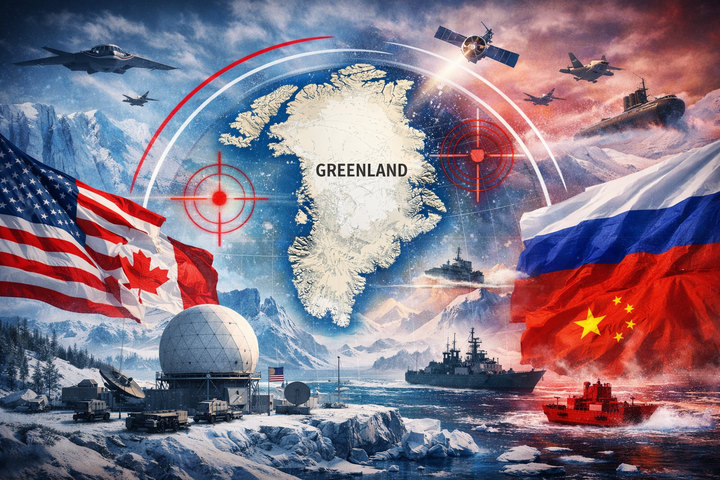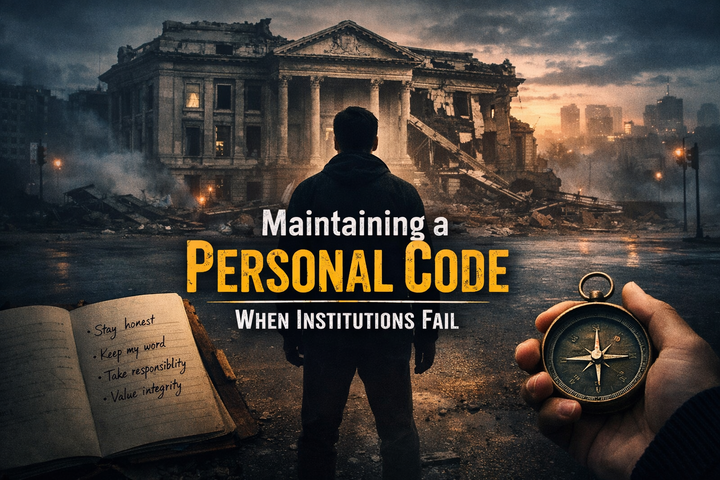Day One of the Digital Dark Age
A what if scenario of a grid and internet failure.

Post is sponsored by MediTAC. Find high-quality, reliable medical kits to prepare you for any situation, from everyday first-aid needs to emergency scenarios.
The screens went black at 3:47 AM.
No warning, no flickering goodbye—just silence.
The internet, that sprawling, chaotic web of human thought and commerce, was gone.
Poof.
A digital guillotine had fallen, severing the arteries of a world that had grown fat on connectivity.

Day One of the Digital Dark Age had begun, and the survivors—those of us still clutching our wits—were left to navigate a landscape as alien as it was terrifying.
The first thing you notice is the quiet.
Not just the absence of notifications, but the hum of routers, the whir of cooling fans—all dead. Cities feel like tombs, their neon arteries snuffed out.
The suburbs, once buzzing with remote workers and streaming kids, are now eerie stills from a forgotten movie.

The countryside?
Well, it’s always been a little closer to this reality, but even there, the lack of signal bars on a phone feels like a death sentence.
The official story trickles in through battery-powered radios: a coordinated cyberstrike, or maybe a solar flare, or—hell, pick your poison—some shadowy cabal flipping the kill switch. Doesn’t matter.
The result’s the same.
Banks are offline, ATMs are bricks, and the global economy’s a ghost.
Your credit cards? Plastic coasters now.
Supply chains? Unraveling faster than a cheap sweater.
Panic’s already setting in—looting’s started in the cities, and the highways are clogged with people who don’t know where they’re going, just that they can’t stay.
But here’s the kicker: not everyone’s drowning. Some of us saw this coming—or at least prepared for it.
Bitcoin, Nostr, and AI aren’t just buzzwords anymore; they’re the skeleton key to survival in this unplugged hellscape.
Bitcoin: The Ghost in the Machine
Cash was king for about five minutes until people realized no one’s restocking the stores. Digital fiat? Useless without servers.
But Bitcoin? It’s still kicking, at least for those who kept their keys offline.
Cold wallets—those little devices or scribbled seed phrases hidden in sock drawers—are now worth more than gold.
The blockchain doesn’t need the internet as we knew it; it thrives on peer-to-peer networks. Some miners are still running on flared gas with connections via Blockstream satallite.
Ham radios, satellite links, even mesh networks cobbled together by tech-savvy scavengers—Bitcoin transactions are still moving, slow but steady.
I traded 0.1 BTC for a week’s worth of canned goods this morning.
The guy didn’t even blink—just scanned my QR code with a handheld rig he’d jury-rigged to a car battery.
Money’s not dead; it’s just gone underground.
The centralized exchanges are toast, sure, but the hodlers, the ones who never trusted the cloud, are the new barons. If you didn’t keep your private keys, you’re begging now.
Nostr: Whispers in the Dark
With X, Facebook, and every other centralized platform wiped out, communication’s a problem.
Cell towers are offline, ISPs are kaput, and the average person’s screaming into a void. But Nostr— that decentralized, censorship-resistant protocol— is our lifeline.
It’s not reliant on some Silicon Valley server farm; it’s a network of relays, some running on solar-powered Raspberry Pis, others on clandestine setups in basements.
I got a message today from a friend 200 miles away.
Took three hours to bounce through the Nostr relays, but it arrived: “Water’s still good here. Head north if you can.”
No corporate middleman, no government snooping—just pure, raw connection. Nostr’s not pretty, and it’s not fast, but it works.
Rumors are spreading already—coordinates for safe zones, warnings about roving gangs, even dark humor about the end of cat memes.
It’s the new town square, if the town’s a smoldering ruin.
AI: The Oracle in Your Pocket
The cloud’s gone, but the smart ones kept local AI models on their machines. I’ve got Grok 3 humming on a laptop hooked to a solar panel—thank xAI for making it lightweight enough to run offline.
No more querying Google or ChatGPT through some distant data center; this is self-contained intelligence.
I asked it this morning how to purify water without a filter.
It spat out a step-by-step using charcoal and an old t-shirt. Later, it helped me rig a basic antenna to catch radio signals.
AI’s not just a tool now—it’s a survival partner. Those without it are fumbling in the dark, while I’ve got a digital brain that doesn’t need the internet to think.
The preppers who hoarded guns and beans are jealous; I’ve got knowledge on tap, adapting to whatever this broken world throws at me.
The New Normal
Day One’s chaos is just the beginning. Power grids are failing as backup generators run dry. Governments are scrambling, but without their digital megaphones, they’re toothless.
The old world’s rules—credit scores, 9-to-5s, streaming subscriptions—are ash. What matters now is what you control: your keys, your nodes, your data.
Bitcoin keeps value flowing where fiat failed. Nostr keeps us talking when the towers fell. AI keeps us thinking when the libraries burned.
Together, they’re the trinity of this dark age—a decentralized, resilient toolkit for a world that’s lost its plug.
Tomorrow, I’ll head north.
The radio’s crackling with rumors of a community rebuilding around a mesh network. They’re trading in sats, posting on Nostr, and using AI to plan crops.
It’s not salvation, not yet—but it’s a spark.
The Digital Dark Age isn’t the end; it’s a purge. And those of us wielding these tools?
We’re the ones who’ll claw our way out.
Stay sharp. Keep your keys close.
The screens may be dead, but the game’s just begun.



Comments ()